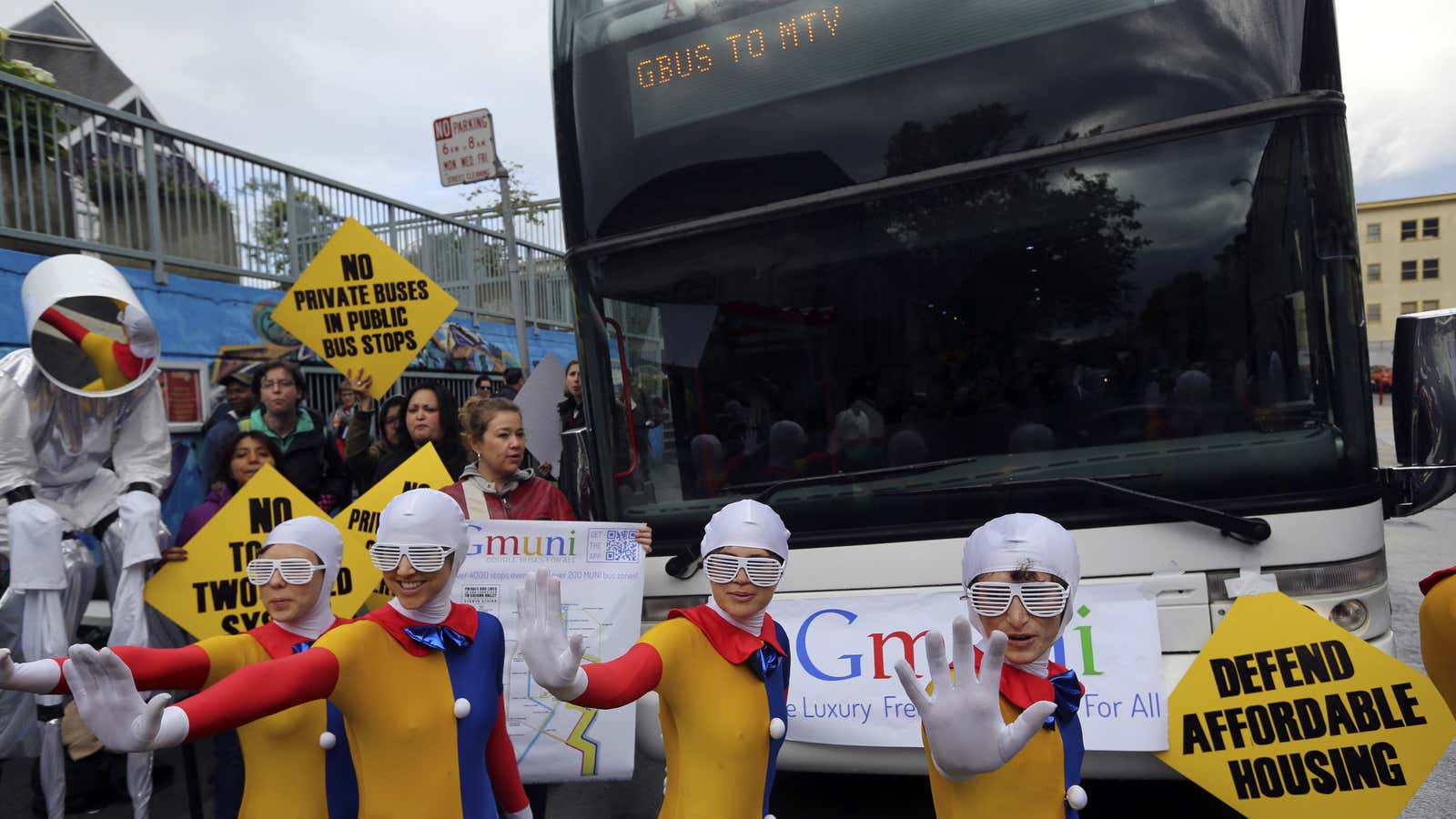People are angry at Silicon Valley. In recent years, protestors have slashed the tires of buses hired to transport Google employees. They’ve occupied Airbnb’s headquarters and participated in worldwide demonstrations against Uber.
These tech titans stand accused of destroying industries and livelihoods, sucking up wealth for themselves while failing to distribute any wider benefits to the rest of us. And they’re guilty, according to media theorist Douglas Rushkoff, author of the forthcoming book Throwing Rocks at the Google Bus: How Growth became the Enemy of Prosperity. He argues that unless Silicon Valley’s fundamental model changes, we’re heading for mass social unrest.
Rushkoff points out that basic economy theory, as laid out economist and philosopher Adam Smith, recognizes three factors of production: Land, labor, and capital. But in the current digital economy, only capital is valued.
“The venture capitalist puts down his money and he’s the only one that gets the return,” says Rushkoff. “The land doesn’t get the return—the neighborhoods affected by Airbnb aren’t getting return on that operation. The Uber drivers don’t get return—they’re unemployed people looking for a gig to try and get by another day.”
Today’s start-ups aim for quick and massive growth, so that they can get sold and give original investors a return on their capital. These business practices have been in place since the industrial age. But Rushkoff says they cannot be sustained for much longer.
“It doesn’t work as well when we reach the limits of our planet, the limits of people’s time and attention,” says Rushkoff. “The ability of big companies to make money with their money has been steadily declining for 75 years.”
Rushkoff argues that several major tech companies operate with intentionally unsustainable business models. Amazon and Uber, he says, work by destroying marketplaces and then using their leverage to move into another area. So while Amazon doesn’t make much money off books, the original industry it disrupted, that’s not a concern for them. They make the bulk of their revenue from other products.
“The Uber model doesn’t work as a long-term taxi business—all the drivers would just go broke,” says Rushkoff. “But that’s not the intent. The intent of Uber is to create a monopoly in the taxi business so they can then hop over into something else like logistics or delivery or drones or robotic cars.”
Then there are companies like Tumblr, sold to Yahoo for a billion dollars despite the fact that it generated comparatively little revenue. (Yahoo has since admitted that it overpaid for the blogging platform.) “It didn’t actually do anything, so there was no actual business,” says Rushkoff. “What is that—is that a success or a failure? It’s a success for the original investors who got a billion dollars of money.”
Google was once an innovative search engine, Rushkoff says. But he argues that since morphing into Alphabet, it’s essentially become a holding company that buys and sells technology companies. He’s also skeptical of Facebook. In order for the tech company to fulfill its growth promises, Rushkoff argues that it will have to generate an enormous amount of ad revenue of the United States.
“The thing I wonder about is, if everything we do is supposed to be advertising-based, then who’s left to sell anything?” he tells Quartz.
Rushkoff recommends several changes that could save the digital economy. For one thing, he thinks we needs more peer-to-peer platforms such as eBay, Etsy and Kickstarter. Such companies effectively distribute the means of production and allow people to trade with each other. He also argues that tech workers need real living wages, and that they should have at least partial ownership of the companies they work for. And startups need to do more to share the benefits of their success. This would create sustainable prosperity, in which companies grow wealth among their employees and the neighborhoods where they operate–thus allowing more spending and further growth.
Rushkoff has a history of making accurate predictions about our digital futures. He wrote on viral media in 1994 and is credited with coining the term “digital natives.” He also wrote a book on the internet in 1992 that was rejected by its original publisher, based on the belief that the online phenomenon would be over by 1993.
This time, he says Silicon Valley CEOs and board directors seem to be receptive to alternative ways of doing business, and are looking for ways to become more sustainable.
“Over the next ten years, I think we’ll see either a significant movement in that direction, or we’ll be in a bad place,” he says.
And what sort of “bad place” might we expect if Silicon Valley fails to change course?
“Basically everybody working for 16 to 20 hours a day for very little pay, doing repetitive tasks that for one reason or another, computers can’t do,” Rushkoff says. “And these will be the lucky people, because at least they’re employed.”
